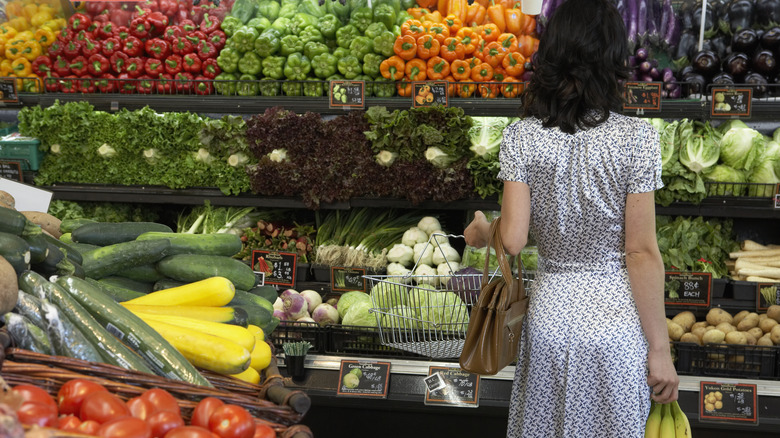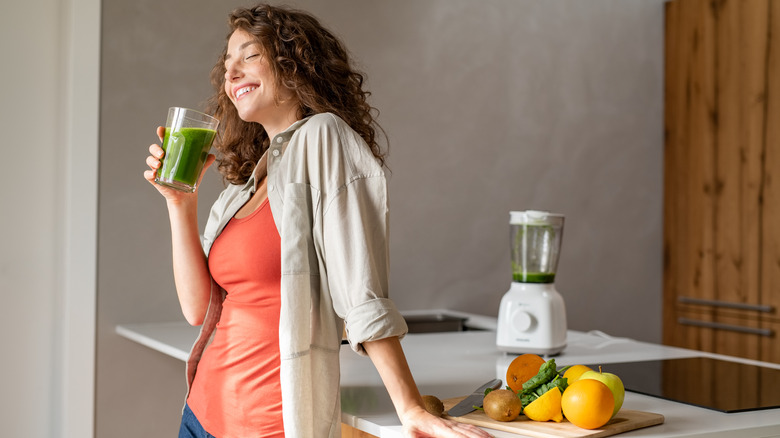Can Drinking V8 Replace Your Daily Vegetables?
Even if you've never tried a V8 beverage, you've likely stumbled upon them when shopping for groceries. If that's the case, perhaps the beverage caught your eye and you wondered whether V8 would be a healthy substitute for leafy greens and other vegetables.
According to Campbell's, the creators of V8, the beverage is plant-based with tomato puree as its main ingredient, grown fresh by farmers in California. The beverage also contains seven other vegetables, including carrots, beets, celery, lettuce, parsley, spinach juice, and watercress, which are also freshly sourced in the United States. Since it's jam-packed with vegetables, V8 provides a considerable amount of vitamin A and vitamin C. As explained by Healthline, the low-sodium version of V8 also contains potassium. In addition, the Campbell's company notes that V8 beverages are free of animal products, so they may be a suitable option for vegetarians and vegans. The citric acid they use in the beverage to regulate acidity also contains no GMOs.
V8 is a healthier alternative to your average soft drink, and one serving of V8 can count as two servings of vegetables, as noted by Healthline. However, registered dietitian and nutritionist Danielle Crumble Smith told USA Today that the vegetable content in V8 isn't enough to satisfy the daily recommendation for consuming vegetables. Let's take a deeper look at why and find out ways you can ensure that you consume enough vegetables in your diet.
Why V8 drinks can't replace your daily vegetables
V8 can be helpful for adding more vegetables to your diet, but the beverage is unable to completely replace eating fruits and vegetables the traditional way. As noted by USA Today, this is mostly due to the drink's low fiber content. Because the drink only contains 2 grams of fiber, a mere 7% of the daily fiber requirement is met by drinking one 8-ounce serving of V8. According to the U.S. Department of Agriculture, the average person following a 2,000-calorie diet should consume 28 grams of fiber each day.
V8 juice is pasteurized with heat, so the beverage may also be missing some vitamins, enzymes, and nutrients that you would have received if you ate vegetables the old-fashioned way, as pointed out by Healthline. In addition, the water in V8 juices is taken out and put back in during a process called reconstitution, making them less fresh than pure vegetable juice.
V8 beverages also contain a lot of sodium, which makes them less healthy than your natural vegetables. In particular, V8's original formula contains 640 milligrams of sodium per serving. Fortunately, a low-sodium alternative was created, which has 140 milligrams of sodium in one 8-ounce serving.
As Healthline notes, drinking V8 is more beneficial than not eating any vegetables whatsoever. However, it's important to keep in mind that you'll still have to consume vegetables in other ways if you want to reap their full benefits.
Ensuring you consume enough vegetables daily
As reported by the Centers for Disease Control and Prevention (CDC), it's recommended that adults eat 2 to 3 cups of vegetables a day. Those who aren't big fans of eating vegetables may be disappointed to hear that drinking V8 isn't a suitable replacement. However, there are other ways that you can drink your vegetables. "[Putting] them in a smoothie where you're actually blending the whole fruit and vegetable and getting the fiber, that's actually going to be best," registered dietitian and nutritionist, Danielle Crumble Smith, told USA Today.
As suggested by It's a Veg World After All, you can use leafy green vegetables, such as spinach, as a base for your vegetable smoothie. If you want to use bitter leafy greens, like kale or collard greens, you can combine them with fruits for a more appealing taste. Other vegetables you may want to add to your smoothies are avocado, cauliflower, sweet potatoes, winter squash, and cucumber. Winter squash, in particular, is an excellent source of fiber, carbohydrates, vitamin A, and vitamin C, as well as other nutrients. Adding cucumbers with their skin on will also provide you with fiber, as well as extra hydration.
In addition, you can try to eat more vegetables during your daily meals. As suggested by the Heart and Stroke Foundation of Canada, you can add vegetables to foods you already enjoy, eat more salads and soups, and add seasoning to your vegetables to make them taste more appetizing.



